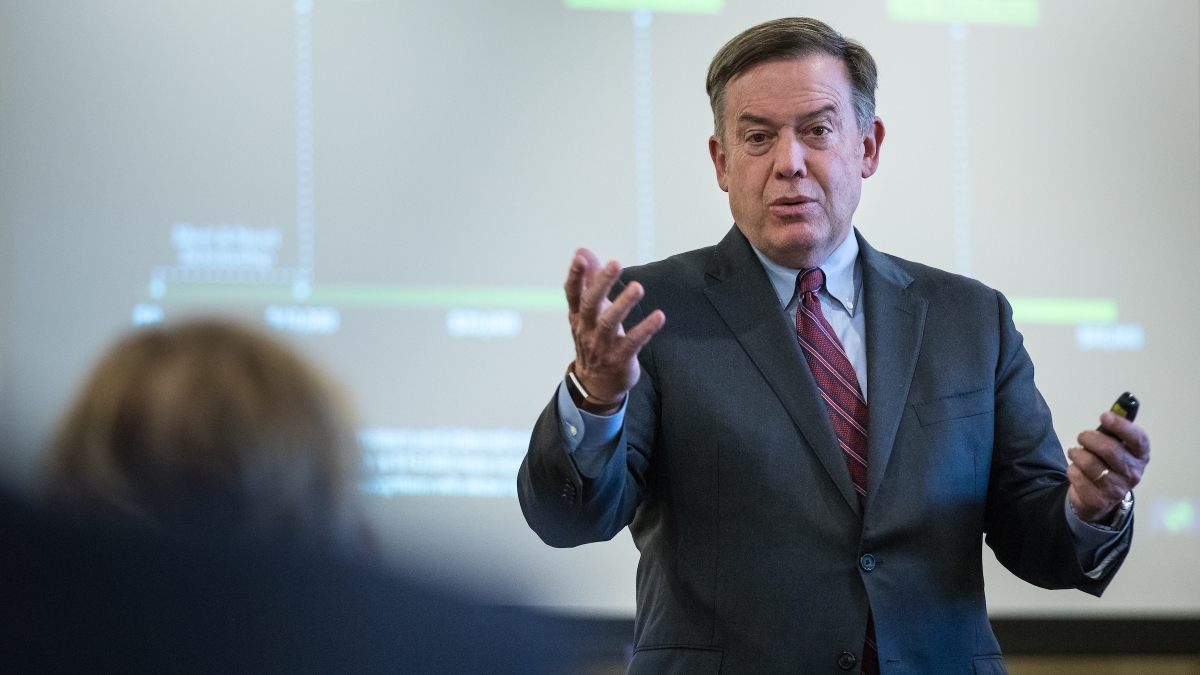Just do it.
That was Arizona State University President Michael Crow’s message to 13 university presidents from around the world who are seeking to put their education online.
“The moment is here,” Crow said. “The technology is viable. The partners are here. The outcomes are measurable. It’s time to plug one’s nose and jump into the water. The only way to do this stuff is to do it. If you sit around in the normal academic world and discuss it, it will take years.”
Crow’s interview was part of the launch of the Mastercard Foundation Scholars Program e-Learning Initiative, which aims to recreate the online learning accomplished at ASU overseas.
“Our degrees for online students don’t say online,” Crow said. “There’s no difference. … We will graduate 12,000 students this (fiscal) year from our online activities.”
ASU offers more than 200 degrees online, from anthropology to user experience.
“I wish we had done this earlier,” Crow said. ASU already had a fully developed online presence before the pandemic, enabling the university to pivot quickly last year.
It was more than putting classes online, Crow said. It began with a “deep transformation of the institution,” beginning with the university charter's mandate to measure itself by whom it includes, not whom it excludes.
Many universities rate themselves on how many applicants they turn away.
“That’s not a measure of anything except how many seats you have,” Crow said. “The goal is the success of all these communities.”
Scaling up learning and reaching more students across the country and world means more people going to college who previously couldn’t. ASU produces four times the number of graduates with the same faculty it had 18 years ago.
“We’re finding ways for students (who have dropped out) to finish,” he said. “We’re seeing fantastic outcomes.”
Financial barriers to access have been removed. Tens of thousands of students pay no tuition at all because the university is operated efficiently with technology. Technologies enable student success.
Looking back at his 19-year tenure at ASU, what would Crow do differently in terms of online education?
“We would move faster,” he said. “We already move faster than anyone else. … What we’re finding is we’re moving too slow. … Think leapfrog.”
The rate of innovation is faster than the academic calendar and universities need to change rapidly.
“I can’t begin to tell you all the things we’re doing,” Crow said. One example he cited was opening a film school in three locations.
The e-Learning initiative will help universities develop and deliver high quality online education anywhere by 2025.
Presidents from 13 universities attended, including Ashesi University and Kwame Nkrumah University of Science and Technology in Ghana, University Abomey-Calavi in Benin, Makerere University in Uganda, University of Gondar in Ethiopia, the University of Rwanda, and American University in Beirut, Lebanon.
Top photo: ASU President Michael Crow addresses an audience at a 2018 event. Crow spoke virtually at the Mastercard Foundation Scholars Program e-Learning Initiative event on Thursday, April 8. Photo by Charlie Leight/ASU News
More Local, national and global affairs

Arizona PBS is now free to stream for Prime Video viewers in the US
Arizona PBS is now available for streaming on Amazon Prime Video. A new partnership between PBS and Amazon brings the station’s primary, high-definition broadcast channel, along with the 24/7 PBS…

First-ever Taiwan Symposium at Thunderbird celebrates business, cultural connections
The investment by TSMC and other Taiwanese corporations in Arizona will reap dividends not only in thousands of new jobs but also in strengthened cultural connections and new methods of…

Study shows that trust drives successful market economies — but not in the way you may think
From fueling our cars to fulfilling daily coffee habits, the average U.S. cardholder makes 251 credit card transactions per year, according to Capital One.Each of these transactions are built…


